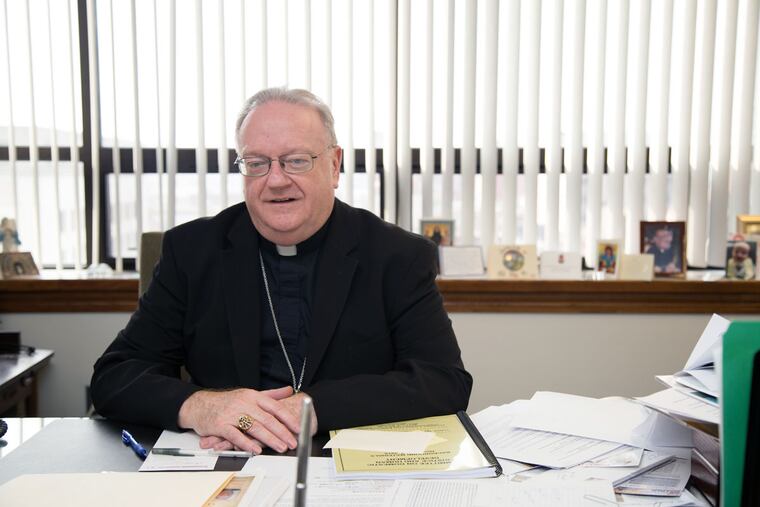A year of merciful thinking
On Sunday, at 10:30 a.m., the Diocese of Camden's Bishop Dennis Sullivan will climb the five front steps of his cathedral and push open its "holy door."

On Sunday, at 10:30 a.m., the Diocese of Camden's Bishop Dennis Sullivan will climb the five front steps of his cathedral and push open its "holy door."
Archbishop Charles J. Chaput of Philadelphia, Bishop David O'Connell of Trenton, and the 3,000 other Catholic bishops around the world will do likewise at their own cathedrals throughout the day, symbolically ushering in what Pope Francis has called an Extraordinary Jubilee Year of Mercy for the Catholic Church.
"It's about healing, about forgiveness," Sullivan said last week. "It's making right your relationship with God and then with others. I think the world needs it."
A distinctively Roman Catholic form of piety, the jubilee calls on the faithful to reconcile themselves with God through prayer and penance, and to show kindness and forgiveness toward others in a concerted way.
"You cannot conceive of a true Christian who is not merciful, just as you cannot conceive of God without his mercy," Francis told a crowd of 50,000 on Tuesday as he opened the bronze santa porta, or holy door, of St. Peter's Basilica in Vatican City.
On Sunday, the pope is to open the holy door of the Cathedral Archbasilica of St. John Lateran, his official seat as Bishop of Rome.
While those doors are bronze and reserved for jubilees, the doors Sullivan will open Sunday are the simple, brown-painted, regularly used front doors of the Cathedral of the Immaculate Conception at Broadway and Market Street in Camden.
Chaput will open the holy doors of the Cathedral Basilica of SS. Peter and Paul before the start of Sunday's 6:30 p.m. Mass.
A jubilee takes its name from the Hebrew word for a ram's horn used for religious celebration. It comes from God's command to ancient Israel to "consecrate [each] fiftieth year, and proclaim liberty throughout the land unto all the inhabitants thereof. It shall be a jubilee for you."
That proclamation of liberty should sound familiar. Taken from Leviticus, it is inscribed on the Liberty Bell and gives it its name.
The Catholic Church held its first jubilee in 1300. It now holds "ordinary" jubilees every 25 years, but a pope may decree a specially themed "extraordinary" jubilee as he chooses.
There have been 26 ordinary and three extraordinary jubilees. Pope John Paul II declared the last one, in 1983, to mark the 1,950th anniversary of Jesus' crucifixion.
"From the time Pope Francis was made a bishop [in 1992], he chose as his motto 'In Mercy Chosen,' " which appears still on his papal coat of arms, said the Rev. Robert Hughes, vicar for administration at the Camden Diocese.
"He has a great awareness of mercy and how it needs to be recognized and demonstrated in the way we live our lives," Hughes said. "He wants us to recognize that the people on the periphery - the sick, the poor, the sinners, the imprisoned - are no different from the people Jesus reached out to."
This worldwide jubilee, which concludes Nov. 20, 2016, also invites the faithful to participate in a series of spiritual exercises, including special prayers and a "pilgrimage" to the cathedral or designated churches of their diocese, where they purposefully pass through the holy doors.
These practices, the church teaches, will spare them punishment for their sins in the afterlife.
Called a plenary indulgence, "it's a concept a lot of Catholics don't understand, and which most Protestants don't accept," Sullivan said.
In the 16th century, the Catholic Church's policy of selling indulgences figured large in Martin Luther's list of grievances that led to the Protestant Reformation.
The church long ago stopped selling indulgences, but it still teaches that even after a priest forgives a person in the sacrament of confession, that person might still face punishment after death in purgatory before entering heaven.
A plenary indulgence erases the punishment but does not shield a person from punishment for future sins, according to the church.
"It's not this free ticket to heaven that discounts our need for change and conversion," explained Meghan Cokeley, director of the archdiocese's Office for the New Evangelization.
The Camden Diocese and the Archdiocese of Philadelphia both said they were planning special events and practices to help Catholics (and anyone else) engage in what the church has long identified as the 14 "works of mercy."
The seven "corporal," or physical, works of mercy call people to such acts as feeding the hungry, sheltering the homeless, and visiting the sick and imprisoned.
The "spiritual" works include "bearing wrongs patiently," "forgiving all injuries," and "comforting the sorrowful."
"Mercy," Sullivan said, "needs to be lived."
doreilly@phillynews.com 856-779-3841